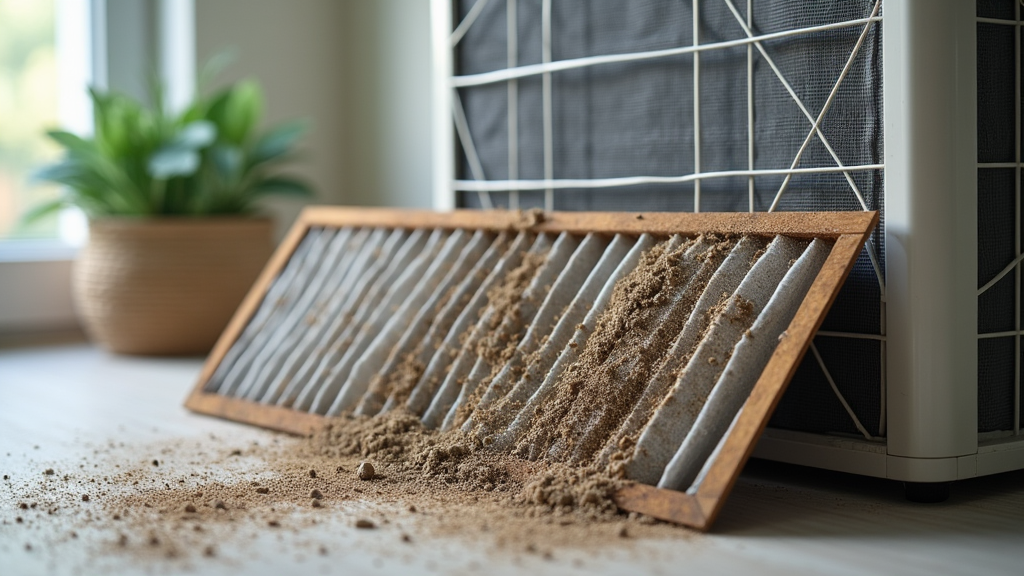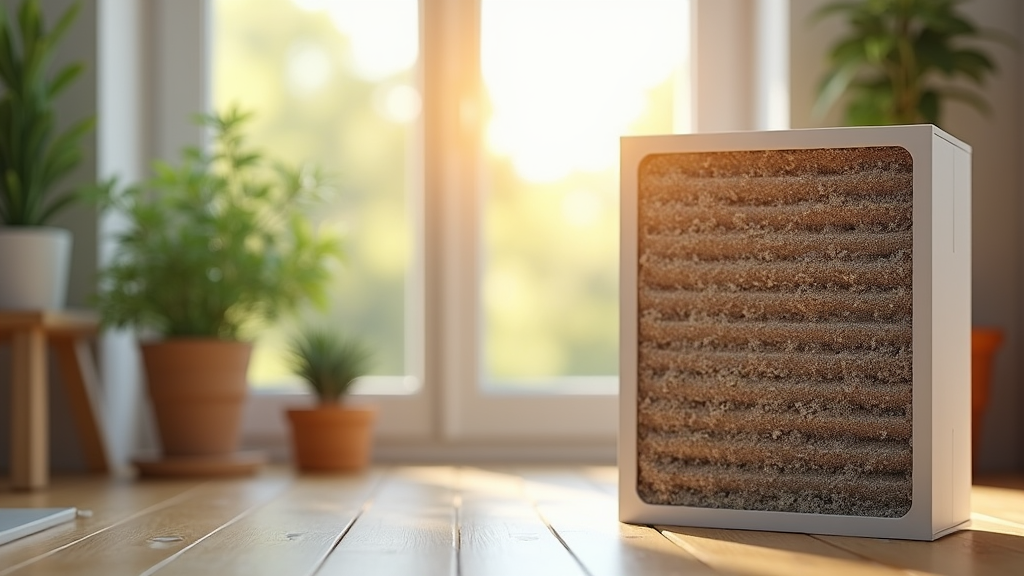A dirty air filter can cause big problems for your HVAC system. It can lower efficiency, lead to costly repairs, and even affect your health. Understanding the signs of a dirty air filter is important for keeping your home comfortable and your system running well.
Key Takeaways
- A dirty air filter can reduce airflow in your HVAC system.
- It can cause your system to work harder, leading to higher energy bills.
- Regularly changing or cleaning your furnace filter can improve indoor air quality.
- Ignoring a dirty filter can lead to major breakdowns and costly repairs.
- It’s important to check your air filter every month, especially during hot summers and cold winters in Fort Worth.
- Consider enrolling in a maintenance schedule to help keep track of your air filter changes and system health.
Why Air Filters Matter
Air filters are important for your heating and cooling systems. They trap dust, dirt, and allergens like pollen and other airborne contaminants. This keeps the air in your home clean. When filters get dirty, they can’t do their job. This leads to more household dust and poor air quality. In Fort Worth, where dust can blow around, a clean filter is even more critical. Environmental factors like smoke from nearby wildfires can also affect air quality, making it essential to maintain your filters. Checking the air quality index (AQI) can help you understand when outdoor air quality is poor, which can impact your indoor air as well. Additionally, filters can help reduce harmful particles like PM2.5 and PM10, which are common in urban areas. If you have breathing issues or asthma, a clean air filter is vital for your health. You might also consider home air quality testing to see how well your air filtration system is working.
How a Dirty Air Filter Affects Performance

When your air filter is dirty, airflow is restricted. This means your HVAC system has to work harder. It may seem small, but over time, this extra work can lead to wear and tear. Your system may break down when you least expect it. This can leave you uncomfortable on a hot summer day or a cold winter night. Additionally, a dirty filter can allow bacteria and mold to grow, which can affect your respiratory health. Dust mites thrive in dirty environments, and a clogged filter can worsen seasonal allergies. If you have dirty ducts, this can also contribute to poor air quality and odors in your home. Remember, the right filter size is crucial for optimal filter performance. Using a filter with a higher MERV rating can help trap smaller particles, improving your indoor air quality even more. Consider using environmental controls to manage humidity and temperature, which can also help your air quality.
Signs You Have a Dirty Air Filter
Reduced airflow
If you notice that your heater or AC unit is not blowing air as strongly as before, it might be time to check your air filter.Increased energy bills
A dirty filter makes your system work harder. This can lead to higher electricity costs. If your energy bills rise suddenly without a reason, check the filter.Dusty home
If you see more dust around your home, your filter might not be doing its job. A clean filter traps dust and keeps it from circulating. This is especially important in Fort Worth, where allergens can be high.Unpleasant odors
A dirty filter can cause musty or stale smells in your home. If you notice strange smells, it may be time for a filter change. Mold can grow in a dirty filter, leading to these odors. If you have an electrostatic filter, it can help reduce these odors by trapping more particles.Frequent system cycles
If your heater or AC unit turns on and off often, it might be a sign of a dirty filter. The system struggles to get enough air.
How Often Should You Change Your Air Filter?
It’s a good idea to check your air filter every month. In Fort Worth, where the weather changes often, you might need to replace it more frequently in summer and winter. If you have pets or allergies, consider changing it even more often. A clean furnace filter leads to better airflow and comfort. Regular filter maintenance is key to maintaining good indoor air quality. Different filter types, like high-efficiency particulate air (HEPA) or activated carbon filters, can also help improve air quality by trapping smaller particles. Make sure to choose the right filter size for your system to ensure maximum filter performance. If you have an air purifier, it can work alongside your HVAC system to further enhance air quality. Also, consider filter cleaning as part of your routine to keep everything running smoothly. Remember, the air filter lifespan can be significantly shortened if you neglect regular changes.
What Happens If You Ignore a Dirty Air Filter?

Ignoring a dirty air filter can lead to serious issues. Your HVAC system may overheat and break down. This can be expensive to fix. Plus, a dirty filter can lead to other problems like mold or dust buildup in your ducts. This can affect your health. Breathing in old dust and allergens is not good for anyone. Keeping your air filter clean is essential for your home maintenance routine. The filter lifespan can be significantly shortened if you neglect regular changes. Taking precautions like regular checks can save you from bigger problems down the line. Remember, maintaining your filter can also lead to cost savings on your energy bills. If you live in an area with high humidity, consider using a dehumidifier to help reduce moisture and improve air quality.
The Right Filter for Your System
Choosing the right filter is important too. Filters come in different types and sizes. Some are better at trapping small particles like pollen and dust. If you are unsure which filter is best for your system, ask a professional. They can help you find the best fit for your needs. Look for filters with high filter efficiency and a good MERV rating to ensure better air quality. Activated carbon filters are great for removing odors and smoke, which can be a concern in Fort Worth. Also, consider using commercial filters for larger systems or businesses. If you have a filter indicator, it can remind you when it’s time to change your filter. Additionally, having a filter warranty can provide peace of mind, knowing that you are covered if something goes wrong.
DIY Maintenance Tips
You can do some simple tasks to keep your HVAC system healthy.
- Check the filter regularly: Look at your air filter each month. If it looks dirty, replace it.
- Keep the area around your unit clean: Dust, leaves, and debris can block airflow. Keep the space around your unit clear.
- Schedule regular furnace maintenance: Have a professional check your HVAC system at least once a year. They can spot problems early.
Benefits of Regular Filter Changes
| Benefit | Description | Impact on System |
|---|---|---|
| Improved Air Quality | Removes allergens and pollutants | Healthier living environment |
| Enhanced Efficiency | Reduces strain on the system | Lower energy consumption |
| Extended Equipment Life | Prevents overheating and wear | Reduces repair costs |
| Cost Savings | Lowers energy bills with efficient operation | Increases long-term savings |
Benefits of a Clean Air Filter
A clean air filter brings many benefits.
- Better air quality: Clean air filters remove dust and allergens, improving indoor air quality.
- Longer system life: Keeping your filter clean helps your HVAC system last longer.
- Lower energy bills: A clean filter allows your system to run efficiently. This can save you money.
- Health benefits: A clean filter reduces airborne contaminants, which is especially important for those with allergies or respiratory issues.
Additional Signs of a Filter Issue
- Visible dirt on the filter: If you can see dirt caked on the filter, it’s time to change it.
- Inconsistent temperatures: If some rooms are hotter or colder than others, it may indicate an airflow problem. This can be due to a dirty filter or issues with your split system.
When to Call a Professional
If you notice any signs of a dirty air filter and can’t fix the problem, call a professional. They can help keep your system running smoothly. For those in Fort Worth, having a local HVAC expert can make all the difference. They understand the unique needs of our area. If you’re looking to improve indoor air quality, consider exploring options for advanced air filtration systems as well. These systems can help combat the effects of environmental factors and improve your respiratory health. If you are concerned about carbon monoxide or other harmful gases, a professional can also check your home for safety.
Conclusion
A dirty air filter may seem small, but it can lead to big problems. Keeping your air filter clean is an easy way to ensure your home stays comfortable and healthy. Regularly check your filter, and don’t hesitate to reach out to a professional for help. Protect your HVAC system and your home by staying on top of air filter maintenance. You’ll save money and breathe easier.
Remember
Your comfort is our priority at Prestige Air. If you have questions or need help with your HVAC system, don’t hesitate to contact us. We’re here to help you stay comfortable in your Fort Worth home.